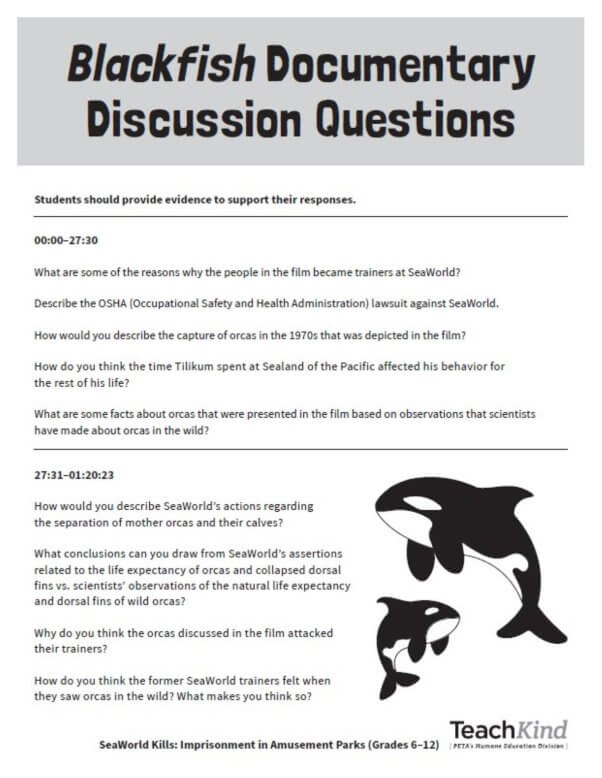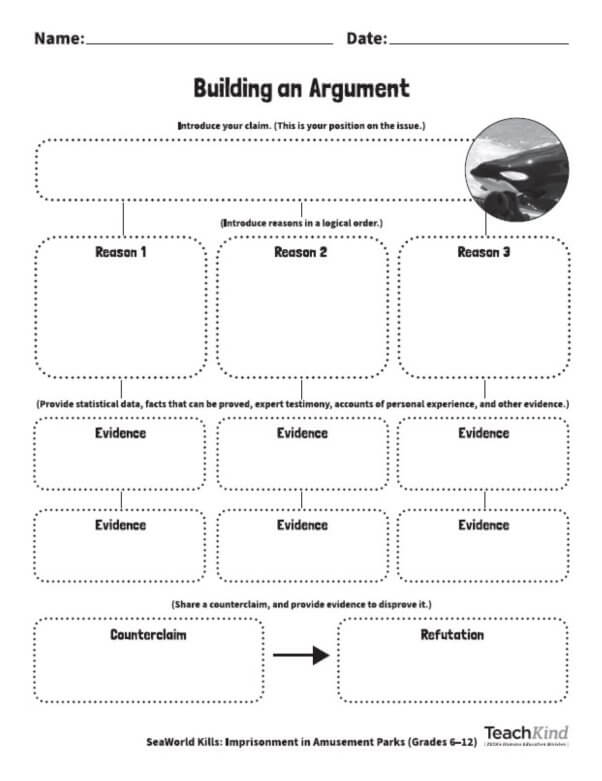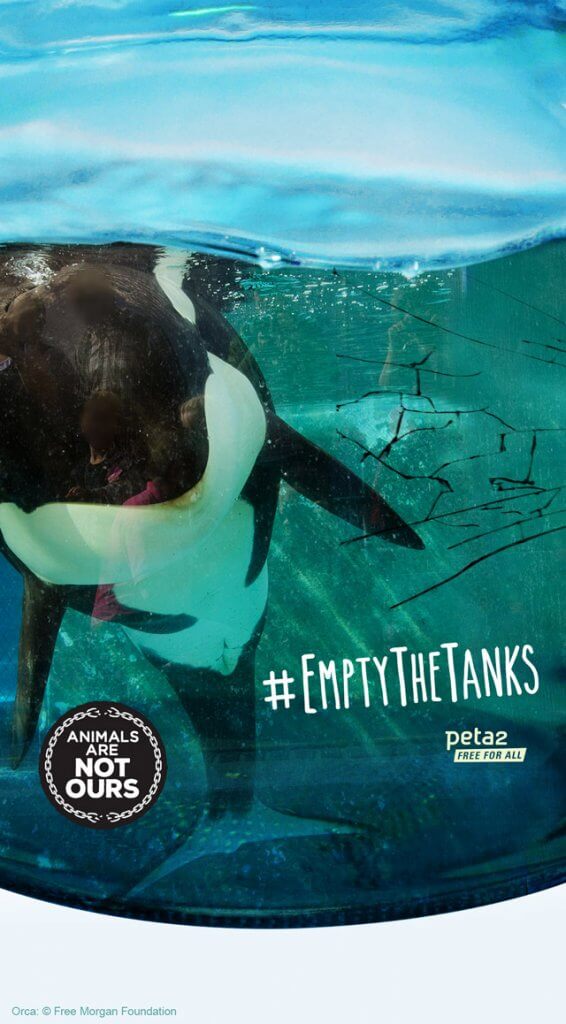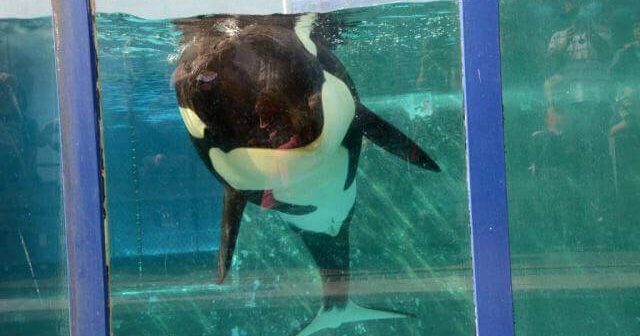SeaWorld Kills: Imprisonment in Amusement Parks (Grades 6–12)
This lesson plan is designed to help teachers present animal rights issues to their students. If you’re an educator, please feel free to adapt this material to fit your needs, and contact us if you need help incorporating this activity into your curriculum.
Suggested grade levels: 6–12
Objectives
Affective: Students will be able to demonstrate an understanding of the lives of orcas kept in amusement parks and why it’s cruel to use them for entertainment.
Cognitive: Students will be able to write arguments to support their claims with reasons and relevant evidence.
Background
Free-roaming orcas live in large, complex social groups and swim vast distances every day in the open ocean. When imprisoned for entertainment, these animals are confined to tanks that are equivalent to the size of bathtubs for humans, restricting them to swimming in endless circles, and they’re denied the opportunity to engage in almost any natural behavior. They’re forced to perform meaningless tricks, and many are torn away from family members when they’re shuffled between parks or abducted from their ocean homes. While free-roaming male orcas live an average of 30 years and up to 60 and females an average of 50 and up to more than 100, 41 orcas have died on SeaWorld’s watch—at an average age of only 14. Not one has reached the maximum life expectancy of the species in nature.
Materials
- Blackfish documentary directed by Gabriela Cowperthwaite (available on Netflix and on the film’s official website)
- Building an Argument graphic organizer
- Blackfish Discussion Questions
Resources
- “BØRNS Speaks Up for Big Cats Used in Circuses” video
- The Debate Kit on Marine Mammals Held in Amusement Parks
Key Vocabulary
Captivity: a situation that makes free choice or leaving difficult
Mammals: warm-blooded vertebrates, including human beings and all other animals that nourish their young with milk produced by mammary glands and whose skin is usually more or less covered with hair
Dorsal fin: a fin on the ridge along the middle of the back of a fish or sea mammal (such as a dolphin or whale)
Motivation
The image below is an advertisement for a social issue campaign on Twitter. Begin the lesson by showing it to the students and asking them to explain what they think it’s referring to. Ask them how they feel when they look at it and why. Have them share their responses as a class.
Before Viewing
Tell students that knowing how to evaluate and create an effective argument is essential when participating in civil discussions about social issues. It’s important to understand an issue fully and develop an evidence-based position about it. Writers explain and defend their positions by providing relevant claims supported by evidence.
To help students make this connection, read the statement “All dogs should be spayed or neutered.” Ask students who agree with this statement to stand on one side of the room and those who disagree to stand on the other. Then, ask them to take turns explaining their position. As a class, discuss which student (if any) has supported his or her position with evidence, such as facts (that can be proved) or statistics. Explain that statements of personal preference aren’t sufficient to support a claim.
Here are some resources on this issue:
Companion Animal Overpopulation
Next, model for students how to use the Building an Argument graphic organizer to determine whether the specific claim made in the “BØRNS Speaks Up for Big Cats Used in Circuses” video is supported by relevant and effective reasons and sufficient evidence.
Play the “BØRNS Speaks Up for Big Cats Used in Circuses” video, and ask students the following questions:
- What is the main claim made in the video? (Humans have a choice to perform, but animals don’t.)
- How does BØRNS explain his reason for this claim? (Traveling circuses transport big cats in small cages, where they must sleep, urinate, and defecate. Circus trainers whip animals and try to make them terrified of them so that they’ll obey them and do ridiculous tricks.) Are the reasons relevant and effective? (Answers will vary.)
- What evidence is this claim based on? (Video footage shows tigers being transported in cages and circus trainers whipping and beating big cats.) Is there sufficient evidence presented? (Answers will vary.)
- Is the evidence credible and accurate? (Possible responses: It’s credible because the video footage clearly shows trainers beating wild animals to force them to perform tricks. It’s accurate because wild animals don’t engage in these types of behaviors in nature.)
During Viewing
Explain that the students will be shown the documentary Blackfish. Use the discussion questions below to help students understand the information and examine the ideas presented in the film. Depending on the needs and abilities of your students, you may wish to pause the film at certain points to go over the discussion questions as a class or have the students respond to them in writing during or after the film.

Tell students that the guiding questions for this activity are the following: Should orcas be held in amusement parks for entertainment? Why or why not?
Inform them that they’ll be asked to take a position after viewing the documentary.
After Viewing
Remind students of the guiding questions: Should orcas be imprisoned? Why or why not? Students should use the Building an Argument graphic organizer to develop an argument that explains and supports their position and uses evidence to support their claims. (Students may need extra time for additional research. The Debate Kit on Marine Mammals Held in Amusement Parks is a good resource for students.)
In pairs or small groups, students can discuss their claim and their reasoning behind the evidence they selected to support it. Then, they can use the ideas from their Building an Argument graphic organizer to write an argumentative essay that delineates the critical features of their position.

Real World Connection
Ask students, “Have you ever been to a marine park or an aquarium? Were you surprised by the things that you learned about them in the film? Would you visit a marine park or an aquarium after watching this film? Why or why not?” Discuss their responses as a class.
Ask students to imagine being trapped in a bathtub for a year or the rest of their life. Ask what they would do and what emotions they would feel? Discuss their responses as a class.
Wrap-Up
Discuss why it’s important to learn more about the impacts of captivity on the lives of orcas and other animals. Have students imagine what captive orcas would say and create message signs to hang around the classroom. Encourage them to share what they’ve learned by posting it on their own social media accounts.
Assessment
Evaluate students’ writing for the use of relevant and effective reasons and sufficient evidence to support their claims as well as their written messages about ways in which they can help captive orcas.
Common Misperception
Marine parks and aquariums provide visitors with educational opportunities.
Reality
Aquariums and marine-mammal theme parks such as SeaWorld, the Miami Seaquarium, and Canada’s Marineland are part of a billion-dollar industry that teaches people that it’s acceptable to imprison animals, deprive them of freedom of movement, forbid them the chance to establish natural territory and explore, breed and group them as we—not they—please, and watch them go insane from frustration and loneliness. The only thing that people learn from visiting a marine park is how miserable life is for the animals confined there. Children who visit these parks see mere shadows of animals, defeated beings who can’t engage in natural types of behavior or live as nature intended.
Extension
- Use the Debate Kit on Marine Mammals Held In Amusement Parks to hold a class debate on the issue.
- Identify an area in your classroom that’s the size of a bathtub and have students see how long they can stay in that area before they get frustrated and bored. Discuss what life must be like for orcas who aren’t free to leave their area as the students could.
- Watch Lolita: Slave to Entertainment with your class. This provocative documentary investigates the tragic capture of the orca Lolita and her lonely life at the Miami Seaquarium. Public opinion on animals in entertainment is turning, and in March 2023 the Miami Seaquarium announced plans to release her to a seaside sanctuary off the coast of Washington state. Sadly, these plans came too late. She passed away in August 2023 after spending more than five decades imprisoned at the Miami Seaquarium in the smallest, bleakest orca tank in the world, deprived of any semblance of a natural life.
Common Core Standards Addressed
- W.6–8.1: Write arguments to support claims with clear reasons and relevant evidence.
- W.9–10.1: Write arguments to support claims in an analysis of substantive topics or texts, using valid reasoning and relevant and sufficient evidence.
- W.11–12.1: Write arguments to support claims in an analysis of substantive topics or texts, using valid reasoning and relevant and sufficient evidence.
- SL.6.3: Delineate a speaker’s argument and specific claims, distinguishing claims that are supported by reasons and evidence from claims that are not.
- SL.7.3: Delineate a speaker’s argument and specific claims, evaluating the soundness of the reasoning and the relevance and sufficiency of the evidence.
- SL.8.3: Delineate a speaker’s argument and specific claims, evaluating the soundness of the reasoning and relevance and sufficiency of the evidence and identifying when irrelevant evidence is introduced.
- SL.9–10.3: Evaluate a speaker’s point of view, reasoning, and use of evidence and rhetoric, identifying any fallacious reasoning or exaggerated or distorted evidence.
- SL.11–12.3: Evaluate a speaker’s point of view, reasoning, and use of evidence and rhetoric, assessing the stance, premises, links among ideas, word choice, points of emphasis, and tone used.
Additional Information
SeaWorldOfHurt.com (for teachers)
peta2.com (for students)
Common Core Standards. © 2010. National Governors Association Center for Best Practices and Council of Chief State School Officers. All rights reserved.





